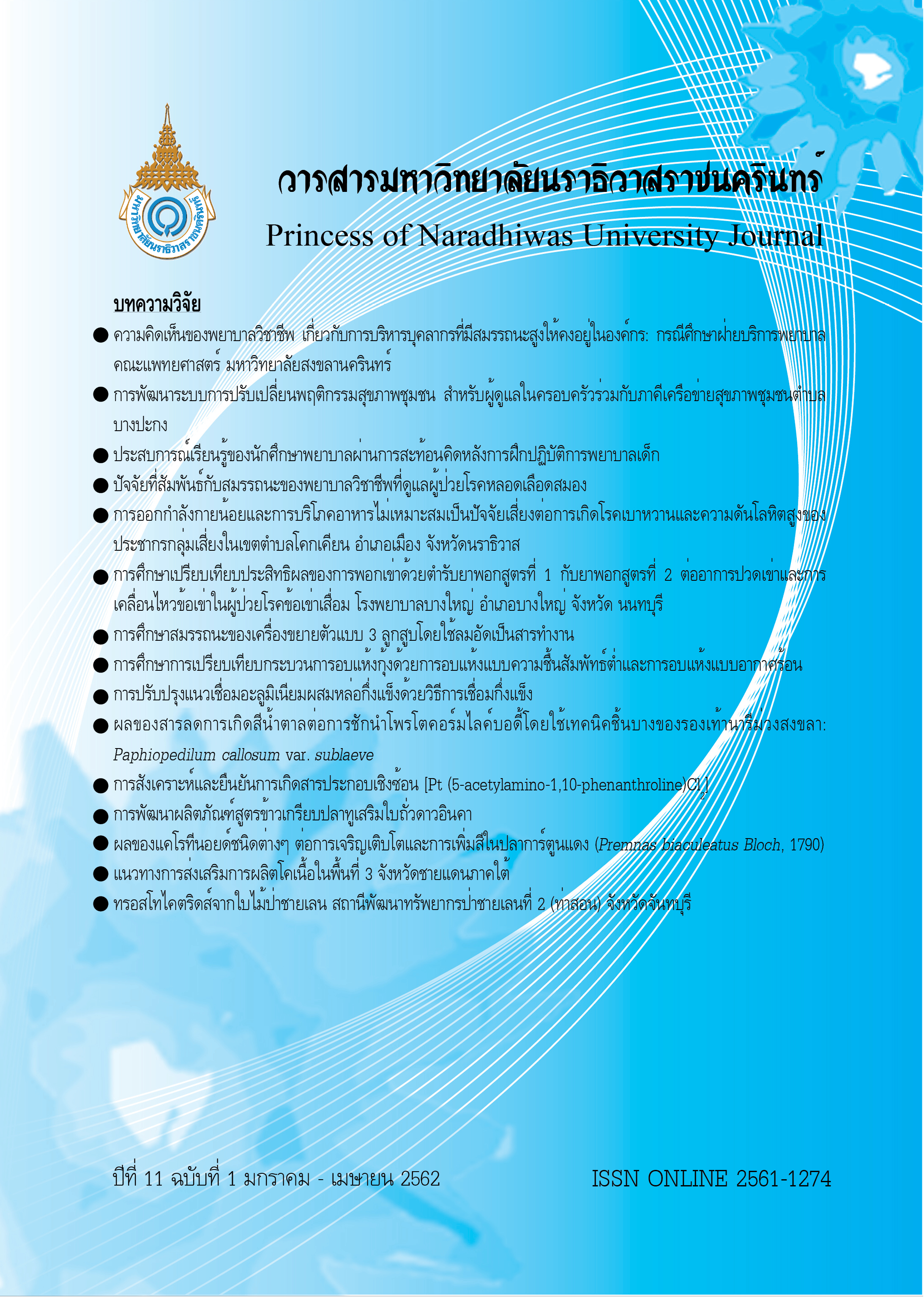Learning Experiences through Reflection on Action in Pediatric Nursing Practice
Keywords:
Learning experiences, Pediatric nursing practice, Nursing student, Reflection on actionAbstract
This qualitative study was conducted to identify the effective learning experiences through reflection on action in pediatric nursing practicum. A total of 89 third-year nursing students, having some practicum experience in the pediatric nursing field, participated in the study by writing their own reflective journal. Then purposive sampling was used to recruit 23 students in order to form 4 focus groups of 6-8 students. Content analysis was then used. Results showed the following. 1. At the beginning of their paediatric practicum, students often felt excited and challenged about creating trust when interacting with children and their families. 2. Science and art in nursing of the third-year nursing students was growing since the application of theoretical knowledge in classroom knowledge into pediatric nursing practice. 3. Self-confidence in both nursing techniques and nursing practice were important to embrace the full dimension of pediatric nursing. As a conclusion, students need to improve their pediatric nursing practice, as pre-practice preparation for nursing practice is an important issue. They need to do case study, and to search evidence-based nursing before going to practice in clinical setting. Thus, teachers should recognize the importance of improving students’ abilities in order to build a trust relationship with children and their families. Such abilities can be strengthened by applying communication techniques in family-center care. The variety of teaching strategies, such as scenarios, role play, writing reflection diary, and so on, can be applied to help students utilize theory or knowledge in practicum context. In addition, staff in clinical facilities should be aware of being a role model for students, so they can learn more effectively how to interact with children and their families.
References
Driscoll, M. P. (2000). Psychology of learning for instruction. (2nd ed.). Boston, MA: Allyn & Bacon Publishers.
Erbsuksiri. A. (2003). Educational Psychology. Bangkok: V Printing Company (1991).
Gibbs, G. (1988). Learning by doing: A guide to teaching and learning methods. Oxford: Oxford Further Education Unit.
Graneheim, U. H., & Lundman B. (2004). Qualitative content analysis in nursing research: Concepts, procedures and measures to achieve trustworthiness. Nursing Education Today, 24, 105-112.
Huang, Y-C., Chen, Y-C., Wang, S-Y., Lee, H-I., & Chen, H-J. (2012). Exploring Taiwanese nursing students’lived experiences of paediatric clinical practice. Retrieved from http://web.hk.edu.tw/~gas/main/ download/journal/68/ 62-76.pdf
Hunter, D. (2010). How clinical practice placements affect professional development. Emergency Nurse,18(5), 30-34.
Klaeson, K., Berglund, M., & Gustavsson, S. (2017). The character of nursing students’ critical reflection at the end of their education. Journal of Nursing Education, 7(5), 55-61.
Klunklin, P., Thaiyapirom, N., & Worakidpoonphol, P. (2008). Learning experiences through reflective thinking diaries on practice of child health promotion among nursing students. Journal of Nursing and Education, 1(2), 2-18.
Lincoln, Y.S., & Guba, E. (1985). Naturalistic inquiry. Beverly Hills, CA: Sage.
Lueboonthavatchai, O. (2005). Health Counselling. (2nd ed.). Bangkok: Chulalongkorn University Press.
Lutz G, Roling G, Berger B, Edelhäuser F, & Scheffer C. (2016). Reflective practice and its role in facilitating creative responses to dilemmas within clinical communication – a qualitative analysis. BMC Medical Education, 16(1), 301.
Maginnis, C., & Croxon, L. (2010). Transfer of learning to the nursing clinical practice setting. Rural and Remote Health Journal, 10, 1313-1318. Retrieved from: http://www.rrk.org.au.
Paiboontananon, J. (2003). Evaluations of nursing care of persons with problems practicum 2 course, topic abnormalofsenseorgan,BorommarajonnaniCollegeofNursing,Bangkok.Journal of Boromarajonani College of Nursing, Bangkok, 29(2), 95-102.
NVivo qualitative data analysis Software. (2012). QSR International Pty Ltd. Version 10
Sherwood,G.D.,&DeutschS.H.(2012).Reflective practice: Transforming education and improving outcomes. Indianapolis: Sigma Theta Tau International.
Suwanbarung, C. (2015). Learning experience of student nurses through reflection on clinical practice: A case study in pediatric nursing, Southern Thailand. Walailak Journal of Science and Technology,12(7), 623-629.
The Office of Learning Commission. (2001). The important of Learning reform. Bangkok: Pimdee Company.
Timmins, F., & Neil, F. (2013). Teaching nursing students about spiritual care - a review of the literature. Nurse Education Practice, 13(6), 499-505.
Treenai, S. (2014). Learning by reflective practice in advanced pediatric nursing practicum: experience and learning results of graduate nursing students. Journal of the Thai Army Nurses, 15(2), 378-385.
Wichainate, K. (2014). Reflective Thinking: Teaching Students to Develop Critical Thinking. Journal of Police Nurse, 6(3), 188-199.




